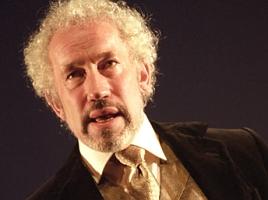The Mystery of Charles Dickens Review from 2012
Right from the start of this one-man show, Simon Callow sets what can only be described as a cracking pace - reflecting, perhaps, the energy and dynamism of the man the play is actually about.
Charles Dickens (1812 to 1870) brought to the world a unique range of extraordinary characters many of which can be named and described by those who otherwise might not be even vaguely interested in literature. Characters such as Scrooge and Oliver Twist are embedded in the British psyche almost like the traditional cuppa, or the British pint. And these characters and the wonderful stories they are part of are regularly re-presented to us in new productions, and revivals of enormously successful shows, such as the musical 'Oliver'. The life of such a 'literary colossus' certainly deserves examination.
In effect, one could describe this play as a dramatised lecture. Mr Callow guides us through Dickens's life and, as that story unfolds, we are introduced to characters from Dickens's most famous works. With a tightly-structured script by Peter Ackroyd, Mr Callow is able to whisk us right through from Dickens's birth to death. It's a tough call, and though the pace is fast, it provides more than a mere overview, even if it raises almost as many questions as it answers.
The overall approach is chronological and we start with Dickens' birth in Portsmouth and early years in Chatham. At the age of 10 Dickens's family moved to a poor part of Camden Town in London where his father fell into debt and ended-up being put into Marshalsea debtors' prison along with most of the family - including their dog. Charles, however, had to work in a shoe polish factory. But his father's finances soon improved thanks to an inheritance and Charles was able to go back to school for a brief spell. The family finances deteriorated again and Charles had to gain employment first as a clerk in an attorney's office and later as a shorthand writer. It was not long, though, before Charles's pen was making him money with his first work published at the age of 21 and his first book at the age of just 24.
What we learn about Dickens is that he was a complex, even an odd kind of character full of 'contrast and contradictions'. The mountain of work be managed to get through and the energy he put into it is almost bind-boggling, but he also commanded respect as a social critic. Thus we are all the more shocked when we learn of his dismissive treatment of his wife of more than 20 years when he fell in love with the much younger Ellen Ternan.
You would be hard-pressed to find an actor who would be more suitable in this role. Mr Callow deservedly enjoys widespread respect as a stage and film actor, and that is because he readily engages with the audience thanks to an authoritative yet warm and generous personality. Mr Callow has that kind of stage presence which holds audiences almost magnetically. His characterisations of Squeers, Oliver Twist, Fagin and many others are sometimes humorous, sometimes poignant and, like Dickens himself, Mr Callow seems genuinely touched by the characters he portrays. In the second half, he ramps up the energy level as he takes us through the latter stages of Dickens's life when the author toured both the UK and the USA, taking his characters and stories to the masses in person, and almost killing himself in the process.
We English might think that we own the copyright on Dickens's literary genius, but we would be wrong. Even from the beginning of his fame with the publication of 'The Pickwick Papers', his work has been enjoyed by a world-wide audience, and I suspect this is still true today. That one man can have such a profound impact on humanity is astonishing and Simon Callow and Peter Ackroyd more than do justice to that incredible legacy.
(Peter Brown)
"Although Callow's enthusiasm and dynamism are impossible to fault, I was left wanting more of the mystery the title promises."
Henry Hitchings for THe Evening Standard
"it is of course possible to have too much of a good thing. And when it comes to the decision to include so many scenes from Dickens's work, the show would again have benefited from a more ruthless editor."
Nicholas Hamilton for The Stage
Originally published on
